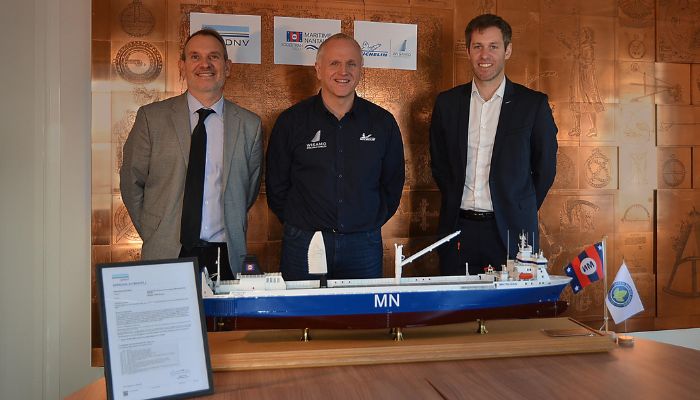DNV Awards Michelin First AiP For WISAMO Inflatable Wing Sail
Nantes, France, 10 February 2023. Classification society DNV has awarded an AiP to Michelin for their WISAMO wing sail process. This is the 1st AiP to have been awarded to an inflatable wing sail style and design and is now remaining set up for tests on the DNV classed MN Pélican.
Very first launched in 2021, the WISAMO sail is an inflatable, retractable, automated wing sail which can be installed on commercial vessels and pleasure boats. The sail is automatic with a system designed by Michelin R&D and is retractable for access into ports and beneath bridges. The AiP has been awarded based mostly on DNV’s WAPS ST-0511 standard.
The initial tests of a WISAMO sail were being carried out on a sailing yacht. At this time installation of a 100m2 system in currently being undertaken on the DNV classed MN Pelican. The 155m long, 8,600 dwt Compagnie Maritime Nantaise ro-ro cargo vessel, operates under constitution to Brittany Ferries and sails involving Poole, Great Britain and Bilbao, Spain. This will make it possible for testing of the system underneath commercial maritime navigation situations.

“We are very happy to acquire this AIP for the WISAMO alternative, said Gildas Quemeneur, Initiative Leader at Michelin. “It is a quite crucial action ahead the further more enhancement of this ground breaking alternative to contribute to maritime transport decarbonization. We are now prepared for the wing sail usage on MN Pelican Ro-Ro that will permit experimental assessments in weighty maritime conditions. All returns of working experience will now add to build the greater WISAMO wing sail.”
“For the maritime market to achieve the ambitious decarbonization targets that have been established by regulators and growing demanded by stakeholders, we need to glance to enabling technologies that can raise vessel effectiveness, cut down gasoline use, and greatly enhance sustainability,” reported Hasso Hoffmeister, Senior Principal Engineer at DNV Maritime.
“This is why we are looking at a developing curiosity in WAPS for entrepreneurs where by the blend of compliance approach, vessel form, and route offer you potential positive aspects. Having said that, as with each and every novel technologies, acceptance and uptake can only expand from a foundation of belief, supported by arduous, trusted and evolving technological specifications. We are really delighted to award Michelin this AiP and appear forward to operating with them as the challenge progresses.”
DNV’s WAPS ST-0511 conventional delivers a framework for the verification and certification of wind support propulsion systems. It can be used in obtaining an Acceptance in Basic principle, a Style and design Approval or a Type approval. These verifications and certifications can also be obtained as component of the integration into a vessel or independently. The ST-0511 complex typical is a enhance to the DNV WAPS class notation, which is focussed on the integration of programs onboard vessels, no matter whether retrofitted or as section of a newbuilding.
An Acceptance in Basic principle is an independent assessment of a idea within an agreed framework, confirming that the design is feasible, and no substantial hurdles exist to reduce the idea from remaining understood. The AIP is generally carried out at an early phase of a challenge to verify its feasibility in the direction of the venture staff by itself, enterprise management, external investors or upcoming regulators.
DNV is also member of the Worldwide Windship Affiliation and aims to use its membership to more assist and speed up the uptake of wind-assisted propulsion devices by the worldwide delivery fleet.
Push Release
Most current Shipping and delivery News

